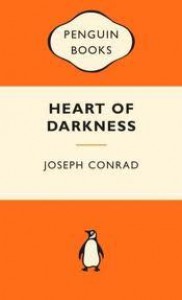Sarah's Library
I read pretty much anything, from fantasy (City of Stairs by Robert Jackson Bennett) to romance (Bared to You by Sylvia Day) to classics (Heart of Darkness by Joseph Conrad). The only genres I don't read are self-help and comic books/graphic novels.
Heart of Darkness by Joseph Conrad

20/11 - Oh dear! This is noted as being a 'difficult' book in the copious notes that preface the actual story. If 'high falutin' readers of literary literature consider it 'difficult' I'm pretty sure I'm going to have trouble.
25 pages later and I'm still reading the notes, and I'm not even allowed to have them count as part of the page count of the book because they're roman numeralised and therefore not actually 'part' of the book (according to the GR PtB who I discussed this issue with whilst reading a previous book). Meanwhile, it's still some 30+ pages that I'm reading, and not really getting (oh GOD, I'm not even getting the notes, which I assume are a dumbed down explanation of the themes and all that other stuff that I'm going to miss completely during my reading of the 'actual' book), and I already feel like I won't even be able to make it all the way through the notes, let alone the rest of the book (purely because of vague themes and literary-type things that go over my head, not subject matter). Groan. Just to be clear, the current rating is for the notes only, which were not written by Conrad. To be continued...
21/11 - On advice from another reader (see the comments) (and due to my own resistance to continue reading if I had to stay with those notes) I have now skipped the last ten pages of the notes and gone straight to the actual story.
This book is listed (now that I've fixed the record, that is) as having 136 pages, that includes 2.5 pages of 'author's note', 1.5 pages of notes for that 'author's note', 16 pages of notes for Heart of Darkness, 3 pages of notes for The Congo Diary (which is included in this Penguin edition), and just over 1 page for a glossary of nautical terms. So in total that's 24 pages included in the page count that aren't actually part of the story. Those 136 counted pages do NOT include 48 pages of notes, a map, and a chronology. Despite that discussion I mentioned earlier I still don't understand why those prefacing notes can't be included in the page count, while the end notes are. Makes no sense to me. To be continued...
22/11 - I spent over an hour (maybe closer to two, it's hard to tell with the number of times I dozed off) reading this last night and I only managed to advance by 17 pages. That must be my slowest reading record ever, and I'm not even blaming it on the constant flipping between the page I'm on and the notes at the back (every page had at least one note to be looked up, and many had four or five). It's like my brain became allergic to the book, every time I picked it up and attempted to continue reading I'd start to drift within a few minutes. I'd hoped to have it finished by now, I'll have another crack at it tonight. To be continued...
28/11 - Well, I've read it. I was told what the theme (or main theme) of the book is - that colonialism or imperialism (depending on which set of notes you read) is bad (in simple terms) - and it's good that I was, because I didn't feel all that aware of the theme while I was reading. Sure, the way the British colonised all their colonies and treated the people native to those countries was dreadful, and this was shown in Heart of Darkness, but it wasn't painted as thick as I expected.
Conrad's Congo Diary was an interesting read. I don't really understand his motive behind going to Africa. I understand why he went, but I don't understand why he'd want to go, and after reading his diary I imagine he would've been questioning the soundness of his own reasoning on the issue.
I'm glad I read this, now I can say that I've read first hand the famous quote "Exterminate all the brutes!" and know in what context it was originally used, but I couldn't honestly recommend it because I didn't find it particularly enjoyable or interesting (but that is kind of par for the course when it comes to 'classic literature'). In the notes at the beginning, Conrad is quoted as saying that he purposefully made the language of the book difficult in an attempt to imitate the difficulties of travelling through the Congo. Well, he achieved his goal, it certainly was difficult to read, but that difficulty means that a lot of readers will be too intimidated to read his book.
I used Cliffsnotes for the first time while reading this (wish I'd had that while struggling through Hamlet!) and it really made a difference in translating the words that I was reading. I would read a section of the book, then the next morning read the Cliffsnotes summary of that section, and it was like a revelation. I was suddenly able to understand what I'd read. I'd highly recommend it for any 'difficult' book that is covered by the website.








 5
5
 9
9